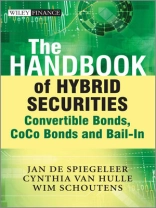Introducing a revolutionary new quantitative approach to hybrid
securities valuation and risk management
To an equity trader they are shares. For the trader at the fixed
income desk, they are bonds (after all, they pay coupons, so what’s
the problem?). They are hybrid securities. Neither equity nor debt,
they possess characteristics of both, and carry unique risks that
cannot be ignored, but are often woefully misunderstood. The first
and only book of its kind, The Handbook of Hybrid Securities
dispels the many myths and misconceptions about hybrid securities
and arms you with a quantitative, practical approach to dealing
with them from a valuation and risk management point of view.
* Describes a unique, quantitative approach to hybrid valuation
and risk management that uses new structural and multi-factor
models
* Provides strategies for the full range of hybrid asset classes,
including convertible bonds, preferreds, trust preferreds,
contingent convertibles, bonds labeled ‘additional Tier 1, ‘ and
more
* Offers an expert review of current regulatory climate regarding
hybrids, globally, and explores likely political developments and
their potential impact on the hybrid market
* The most up-to-date, in-depth book on the subject, this is a
valuable working resource for traders, analysts and risk managers,
and a indispensable reference for regulators
关于作者
Jan De Spiegeleer (Geneva, Switzerland) is head of risk
management at Jabre Capital Partners, a Geneva-based hedge fund. He
earned an extensive knowledge of derivatives pricing, hedging and
trading while working for KBC Financial Products in London, where
he was managing director of the equity derivatives desk. He also
ran his own market neutral statistical arbitrage hedge fund (EQM
Europe) after founding Erasmus capital in 2004. Prior to this
financial career, Jan served ten years in the Belgian Army as an
Officer. With Wim Schoutens he co-authored the Handbook of
Convertible Bonds published by Wiley.
Cynthia Van Hulle (Leuven, Belgium) is a full professor
of Finance at the Department of Accounting, Finance and Insurance
of the Faculty of Economics and Business at the Catholic University
of Leuven. Over the last 20 years she has acquired extensive
practical experience through her board memberships in the financial
sector and organization of in-company training programs. She has
published considerably in scientific journals a.o. Journal of
Banking and Finance, Journal of Finance, Journal of
Corporate Finance, European Financial Management,
Journal of Business Research, Journal of Business,
Finance and Accounting, Small Business Economics. She
also held the Francqui-chair and is co-author of several books in
corporate finance.
Wim Schoutens (Leuven, Belgium) is a research professor
in financial engineering at the Department of Mathematics at the
Catholic University of Leuven, Belgium. He has extensive practical
experience of model implementation and is well known for his
consulting work to the banking industry and other institutions. In
particular, he is an independent expert advisor to the European
Commission (DG-COMP) on impaired assets and asset relief measures
and has assessed in that position more than EUR 1 trillion of
assets; in particular he was one of the main expert advisors for
the stress test on the Spanish banks and the related bailouts. Wim
is also the author of several books including Contingent
Convertibles (Co Cos): Structure and Pricing, the first book
ever on Contingent Capital and Co Co bonds (written together with
Jan De Spiegeleer). He is Managing Editor of the International
Journal of Theoretical and Applied Finance and Associate Editor of
Mathematical Finance, Quantitative Finance and Review of
Derivatives Research. Finally, he is member of the Belgium CPI
commission and independent director of the Board of Assénagon
Asset Management S.A.












